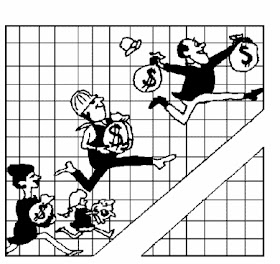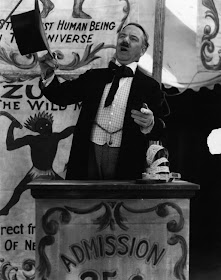I recently read that the historian Bernard Lewis once considering writing an essay on economics, but confessed he couldn't get past his own first paragraph. He had written, “In the history of human thought science has often come out of superstition. Astronomy came out of astrology. Chemistry came out of alchemy. What will come out of economics?” Its such a good joke, Lewis figured saying anything else would just be repeating himself. Luckily, I have no such inhibitions. But then I also have no problem describing the World War One slaughter of Armenians as a holocaust, which Professor Lewis refuses to do. I guess we all tend to underestimate the power of our own psychology to confuse us...much as the ideologues of economics continue to do.
“Consumption is the sole end and purpose of all production; and the interest of the producer ought to be attended to, only so far as it may be necessary for promoting that of the consumer.”
The Wealth Of Nations
The godfather of capitalism was the fatherless Scotsman, Adam Smith (above). He presented to the world a “large nose, bulging eyes, a protruding lower lip, a nervous twitch, and a speech impediment” He had no love life that we know of, admitting “I am a beau in nothing but my books” And he wrote just two books – which was good because he was a really boring writer. He may be the most quoted lest read author since Moses. He wrote “The Theory of Moral Sentiments”, first published in 1759, and “An Inquiry into the Nature and Causes of the Wealth of Nations”, first published in March of 1776 - a month before the start of the American Revolution.
The Theory Of Moral Sentiments
I give the date for the first publications of Smith's books because he never stopped re-writing them. Where the modern author fixes his mistakes by issuing an entirely new manifesto, yearly, Smith reworked his books until he ran out of time. There were four editions to “Moral Sentiments”, and five editions of “Wealth of Nations”. And with each edition they got longer, and more verbose. More than one reviewer has described “Wealth of Nations” as“tedious” and Thomas Jefferson recommend readers consult another author because he “treats the same subject on the same principles, but in a shorter compass and and more lucid manner” than Smith did.
“To widen the market and to narrow the competition, is always the interest of the dealers…who have generally an interest to deceive and even oppress the public, and who accordingly have, upon many occasions, both deceived and oppressed it.”
The Wealth Of Nations.
The defining moment in American economics was the great depression. Fundamentalists adhere to the Old Time Religion of Roosevelt's New Deal; in time of business down turn, government should prime the pump, putting money into circulation to fuel a business recovery by investing in infrastructure for future development. Reform Theorists, like the Chicago School, contend the New Deal was actually a total failure. The key to economic stability, in their view, is faith in private enterprise and distrust of government enterprise. Why the generation which actually experienced the depression refused to believe the New Deal was a failure, is never explained in the Chicago School ethos. And they expend a great deal of energy ignoring the godfather of capitalism, Adam Smith, when he virtually screams in both of his methodical works, that private enterprise, if left to its own devices, may be relied upon to destroy its own markets. To paraphrase Karl Marx, capitalism will bury itself.
“The subjects of every state ought to contribute towards the support of the government, as nearly as possible, in proportion to their respective abilities (to pay)...”
The Wealth Of Nations.
Of course the first thing you notice when reading Adam Smith is that he never uses the word “capitalism ”. It had not been invented yet. And neither had the word psychology. But both were Professor Smith's subject when he wrote: “Every individual... intends only his own security; and...intends only his own gain, and he is in this...led by an invisible hand to promote an end which was no part of his intention.” And thus we meet Smith's magical “invisible hand”, used ever since he wrote that sentence to justify the greed, waste and “gluttony of the wealthy”, to also quote Adam Smith. But that same invisible hand, says Smith, must also be guiding the tyranny of a socialist majority - for the greater good. It is the balance of the two which Smith promotes in his works, not a domination of one over the other. At times he seems to be channeling thinkers like Karl Marx - from a century in front.
“Our merchants and masters complain much of the bad effects of high wages in raising the price and lessening the sale of goods....They are silent with regard to the pernicious effects of their own gains. They complain only of those of other people.”
The Wealth of Nations..
Dubious legend says that Adam Smith was once awakened from a muse to the sound of church bells. Dressed only in his nightshirt, he awoke to discover he had walked, lost in thought, fifteen miles from his home on High Street in Kirkcaldy (below), to the outskirts of Durnfermline (above), Scotland. To have made that journey he would most likely have followed the Invertiel Road southwest to the village of Dalgety, before turning north west to Durnfermline. If he had done so, why did no one from Dalgety stop the lunatic wandering about in his night shirt? The story reads like the old joke about the man with a wooden leg named Smith. The punch line is "What is the other leg called?" But the two towns did play an important role in Smith's thinking.
“The man of system…seems to imagine that he can arrange the different members of a great society with as much ease as the hand arranges the different pieces upon a chess-board. He does not consider that...every single piece has a principle of motion of its own, altogether different from that which the legislature might choose to impress upon it.”
The Theory Of Moral Sentiments,
Durnfermline had been the ancient seat of Scottish royalty, and had caught the first wave of industrialization, growing rich by mass producing the luxury damask weaves. But the feudal center had been outstripped by the hand looms of the port city of Kirkardy, which had tripled its output of simple linen over ten years (1733 -1743). As a youth Smith had thus seen first hand the power of capitalism to create and to waste, both markets and the lives of the workers and consumers. The citizens of Durnfermline were now left without work, starving and abandoned by a social structure designed for field workers, who grew what they ate. Smith admitted that his invisible hand was always ready to pick a pocket, even if only its own. And the legislature he derided in the above example might be a liberal “socialist” body, or a conservative body protecting its wealthy members. Neither brand of political theater impressed Adam Smith. He believed in the bible, and in particular its ancient warning about the love of money being the root of all evil. He knew, and preached, that capitalism was not about the "job creators", but about the consumers, the middle class - created by capitalism and feeding capitalism. They are the wealth of a nation - not gold or stock values or stock brokers. Without a healthy, growing middle class there can be no capitalism. That was the lesson Adam Smith was trying to teach.
“No society can surely be flourishing and happy, of which the far greater part of the members are poor and miserable.”
The Wealth Of Nations
- 30 -















No comments:
Post a Comment
Please share your reaction.